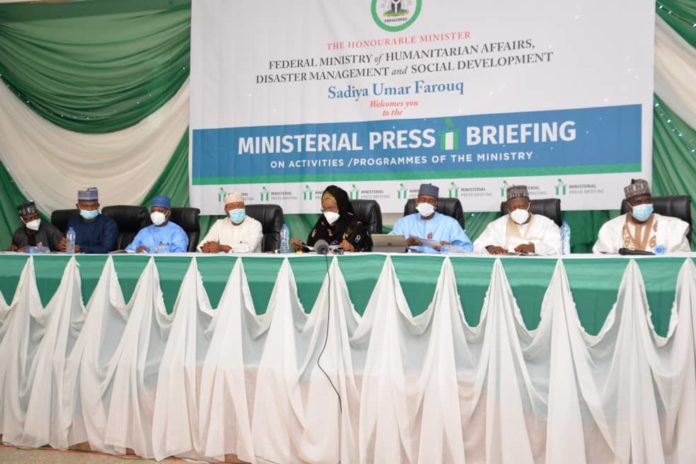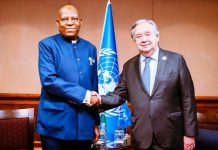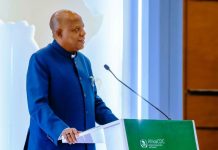
The Honourable Minister of Humanitarian Affaris Disaster Management and Social Development, Sadiya Umar Farouq had said that about 3.7 million households comprising of more than 15.5 individuals have been captured on the National Social Register.
The Minister disclosed this at the Ministerial Press Briefing held at the National Press Center, Radio House, Abuja.
She said of that number over 2.8 million of the households which comprise of 13.5 million individuals are eligible for Conditional Cash Transfer, spread across the 36 States and the FCT.
“In line with Mr. President’s directives to expand the National Social Register, we have developed a strategy for targeting the urban poor. This register will use an existing databases from the National Communication Commission (NCC), and the Bank Verification Number (BVN) from Nigeria Inter-Bank Settlement System (NIBSS). Here we are Collaborating with the Central Bank of Nigeria and the Ministry of Communication and Digital Economy.
“We have completed the development of the templates, data collection applications and other logistics for the smooth take off of the programme.
The Minister said with the support of World Bank “we have finalised the Urban political wards poverty maps for self- registration of potential beneficiaries through SMS and or USSD”.
In addition, the Minister noted that the Ministry deployed an evidence – based approach to all it’s activities and developed the COVID-19 Shock Response Social Protection Strategy which include cash transfer, food distribution and infection prevention materials distributed to the poor and vulnerable. We have also developed a plan for the post COVID-19 recovery period which are job creation, farmers grants and livelihood projects.
” Our strategy is to build resilient structures that include the Nigeria vulnerable youth”.
The Minister said the Ministry was established in August 21, 2019 by His Excellency, President Muhammadu Buhari with the vision to create sustainable and inclusive Social systems that promotes human dignity in Nigieria. The Ministry is to coordinate, promote and strengthen social system that provide support for humanitarian needs, integrating best practices, mechanisms and solutions through effective utilization of data, research and planning.
According to Farouq, The Ministry’s mission is to “coordinate, promote and strengthen social system that provide support for humanitarian needs integrating best practices, mechanisms and solutions through effective utilization of data, research and planning.
Adding that, the Mandate of the Ministry is “to develop Humanitarian policies and provide effective coordination of National and International Humanitarian interventions; ensure strategic disaster mitigation, preparedness, and response; and manage the formulation and implementation of fair, focused, social inclusion and protection programmes in Nigeria.”
The Ministry has six Agencies through which the programme are being implemented nationwide.
Farouq also said that in the past one year, the Ministry has been able to initiate the development of a policy for Humanitarian Affairs, Disaster Management and Social Development while collaborating with other MDAs on the review of and update of existing policies as it relates to the Ministry.
The Minister also said that it has initiated development of policy for Humanitarian Affairs while collaborating with other MDAs on Social Development to review the update as it relates to the Ministry and stakeholders.
She said the National Policy for Humanitarian Affairs, Disaster Management and Social Development encapsulates a number of existing policy initiatives by agencies and programmes as listed in the table shown on the screen. The National Social Protection Policy being reviewed in collaboration with the Ministry of Finance, Budget & National Planning, and other stakeholders. This is a critical component of an overarching holistic national policy on Humanitarian Affairs, Disaster Management and Social Development,
adding that the Ministry also worked with International Organization such as IOM, UNHCR, WFP among others which has recorded huge success in the area of peace, security and humanitarian activities currently put in place to ensure humanitarian development, peace nexus approach in mitigating vulnerabilities.
“The Ministry has also developed the Civil-Security Cooperation (CiSEC) in Humanitarian Interventions to effectively tackle issues of access, coordination and communication between humanitarian actors and security sector towards the seamless delivery of humanitarian action to the. vulnerable. Since its adoption, the structures within the CiSEC framework have tackled and resolved critical humanitarian issues, assessed and prioritised options for access for the humanitarian community and provided an ecosystem for stakeholders to collaboratively develop policies for the coordination of humanitarian action in Nigeria”. The minister added.
Farouq mentioned that the Ministry have worked with its agencies; National Emergency Management Agency (NEMA), National Commission for Refugees, Migrants and Internally Displaced Persons (NCFRMI), National Agency for Prohibition of Trafficking In Persons (NAPTIP), North East Development Commission (NEDC), National Commission for Persons with Disability (NCPD), Sustainable Development Goals (SDGs), in carrying out its mandates.
Farouq stated that the collaboration and collective efforts by all the agencies have cushioned the effect of the lockdown in the country, particularly in the already vulnerable sections of Nigeria”.
She also recognized that the media are friends of the Ministry and called for collaboration to pass the right information to the public.
She assured the general public that the Ministry will continue to discharge its duties with greater focus on the strategy to lift many Nigerians out of poverty in the nearest future. She reiterated the commitment of the Ministry create sustainable and inclusive social systems that promote human dignity in Nigeria.
Rhoda Ishaku Iliya
Deputy Director Information
30th November, 2020





